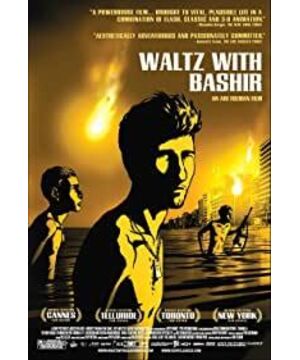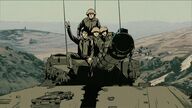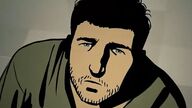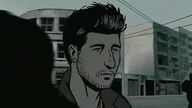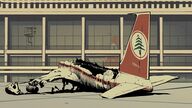watching "Waltz with Bashir", the inner feeling is quite unfair, and the anti-war theme is described by the director as an understatement. The film tells the story of the 1982 Israeli armed invasion of Lebanon, which resulted in the massacres in Beirut, Sabra and Shatila refugee camps.
Not sure what kind of state of mind the surviving refugees will be in if they see this film one day, but I think they won't have any ideas anymore, the film won't change anything, just like "Dear" in its essence Speaking of which, it will not change the fact that human beings like to abduct and sell children. If there is no business, there will be no harm. But in a world with human beings, will there be a day when there will be no business?
"We send strangers to hell, and of course we hurt innocent people on the road. If I'm not far from death, I'd say I bomb Beirut every day." Whether this is a dream or a cruel reality has been embedded in the numbness Consciousness expressed in the body. Soldiers are a special group. They originally have independent thoughts, but soldiers on the battlefield can only be reduced to a killing machine. They gradually get lost in the quagmire of blood and belief and seek for themselves. The process is painful and painful. despair. The film is a work written and directed by Israeli director Ali Forman, and he also created it based on his own experience. Several scenes in the film are very impressive to me, one is of course the classic waltzing with Bashir, which is supposed to describe the horror of the battlefield, but the director uses this hallucinogen-like lens to tell us that war is terrible, and even more so. It's helpless, in that case, then let's pretend to enjoy it, let the battlefield become a dance floor, let the gunfire become a melody, let the enemy dance with us, since we are leaving after all, why not focus on such a focus, slowly away. Is this nonsense? No, that's why the name of the film is waltzing with Bashir. In fact, the film is not just for serving this scene. He wanted to make us unforgettable about the war in this way. Who was Bashir, the then president of Lebanon? Does it matter? This is not important at all, maybe in reality he is very important, he is the cause and the end, but in the film, he is just a huge poster hanging on the high wall of the city, full of wreckage after the hail of bullets Kong, for the slaughtered Beirut refugees, who is the murderer, Bashir, the Falangist Christian soldiers who followed him, or the Israelis, there is no definite answer, and all seemingly reasonable conclusions will also be dismembered by the parties involved. Complete justice, for the slaughtered, maybe all of this is the fault of God. He created human beings, but he also let them go, allowing human beings to be so reckless and contented in cannibalism, as if they could still see that. The Christian soldier who shot the old man with a gun forcing him to kneel, shrugged indifferently, patted the dust and blood on his body, turned to leave, and resolutely refused, and the Israeli soldier who learned of the result only understood that just now. What happened, but there is no recollection of the life just passed, and it is really irrelevant, they are just machines, they are just performing tasks, after they complete their tasks, they will return to their homeland, back to their families, and enjoy Dinner and hugs, will use amnesia therapy to forget the past, just like the director of this film
Secondly, the crisp music at the beginning, the crazy wild dog, the dim sky and the lights at night, this is the director's friend's dream, but it's real. The wild dog has a strong symbolic meaning, which is like an ultimate proposition. Who brought them, they look so terrible, the ultimate question is who will take them away? They don't keep chasing, but they may stay forever.
The scene of the tank soldiers marching singing "Good morning, Lebanon" has the same effect as the scene of dancing with Bashir, which allows us to relax for a while while watching the movie. In other words, this song sounds really good, but it's always beautiful. It was short-lived, and the cruelty came again. The copper walls of the tank did not retain the soldiers' bodies. We saw the commander who escaped (this guy has not been in office for more than 2 minutes) and became the only survivor. , We were nervous for him, but not on the battlefield, he couldn't understand that kind of fear at all. He recalled his past, childhood, mother, and twilight, like the moment when a person was about to die, But God didn't want to see him, he survived, and in his later speech (perhaps because of the language) it didn't seem to be that memorable, but he did want to forget it, because it wasn't a It was an unforgettable thing for him, but it was something that made him feel sad. Maybe he should have died with his comrades at that time. Sometimes it is more painful to be alive than to die. This may be the trauma of war.
Then came a field rock, yes, we danced and sang in the hail of bullets, "I bombed Saida today, I was in the morning sun, I almost came home in a coffin, I bombed today Saida", these scenes are very funny, does the director want us to experience the cruelty of war or to tell us that war is also such a fun thing, but my understanding is that it is a painful Faith, but you don't need to be sullen every day. If you don't have fun in the world, then the next moment, when God calls you, you have to show your long-cherished smile and shake hands with him. Okay, so the question is, what exactly is the 'patchouli' that Frank is talking about next? I still only understand the song, "I bombed Beirut today, I bombed Beirut every day, if I am not far from death, I would say, I bombed Beirut every day, when the trigger is pulled, we will send strangers to Go to hell, of course we will hurt innocent people on the road, if I am not far from death, I will say, I bomb Beirut every day."
I like that red sedan.
In the quiet woods, the soothing music, the mottled light and shadow, the child holding the RPG, "Bang", the destroyed armored vehicle, just such a scene with strong dramatic conflict, but it is stated in this way, we start I'm used to the director's narrative language, always in a calm state, someone is invited to see God every minute, but why are the soldiers always so afraid, as if the bullets in their machine guns are infinite, even if they are caught by mosquitoes One bite, and they'll pull the trigger endlessly for eternity.
The biggest shock was left at the end, when Amos Naman stopped the car and shouted "Stop shooting! Stop shooting now! This is an order! Stop shooting! Everyone go home! Give me now! I'm going home, now!" There was a 5-second silence in the big panorama, the Falangists continued to walk out, and the lucky refugees went back home like ghosts, still dimly tinged, with lonely tanks and groups of houses impacting Composition, everything is simple and intense. Everyone went home and the Falangists could go back to hug their wives and kiss their children, but what about the refugees, the city was in ruins and corpses were everywhere. The rest of the women and children, the old and the weak, are just like ghosts. Our eyes followed those women and children to the soldier holding the weapon. Although he expressed shock and helplessness like the refugees, we didn't want to seek justice, and we didn't know what to do. What are we going to do, but if we don't go to them, where can we go?
"That's it, the massacre is over."
View more about Waltz with Bashir reviews


